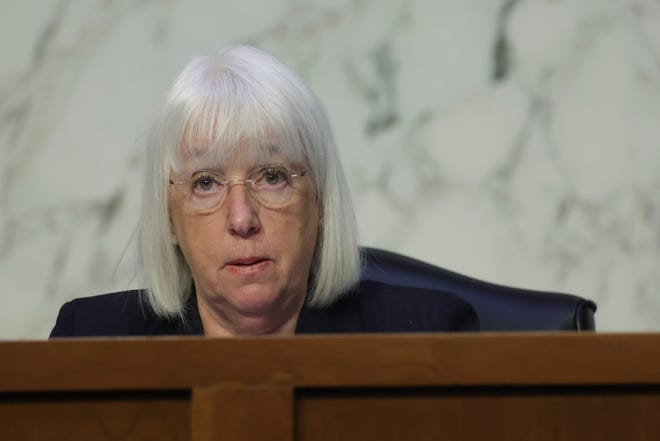
The pandemic exposed just how broken the country’s child care system is: It costs parents too much and pays employees too little. More than half of the country’s residents live in a child care desert.
A recent report by ReadyNation, a coalition of business leaders, reveals the impact of those fissures on the nation’s economy – including individual taxpayers.
According to the report, insufficient care for children under 3 depletes the country of $122 billion each year in lost earnings, productivity and revenue. That’s more than double the $57 billion in losses in 2018, the analysis found.
“The nation’s economy rests on the shoulders of early care and education teachers, and the system that they’re in is on the brink of collapse,” said Allyx Schiavone, a prominent early-childhood education advocate from Connecticut, at an event Tuesday meant to reiterate calls for greater federal investment in child care ahead of Tuesday’s State of the Union.
“When parents can’t find child care, they can’t work. It’s really simple,” continued Schiavone, who will be the guest of Rep. Rosa DeLauro of Connecticut at President Joe Biden’s address. “And when they can’t work, families and businesses suffer. Building a better child care system is the best opportunity to unlock the power of our nation’s economy.”
Child care deserts:COVID-19 made them even worse, leaving working parents to scramble
Parents desperately need child care:But day cares are struggling to retain workers.
Parents forced to choose between child care and work
Especially when compared with other developed countries, the United States invests very little in child care. The businesses that employ Americans tend not to invest much in that care either.
As a result, nearly 3 in 4 parents surveyed said access to child care is a challenge. And that hurts them in the workplace: Nearly 1 in 3 parents said they’d been reprimanded at work because of child care problems, and roughly a quarter said they’d either quit or been fired from a job.
Meanwhile, 41% said such problems have forced them to turn down a new job offer. Thirty-six percent said they’ve turned down further education and training.
“When I have needed child care to put a roof over my children’s head and food on the table, I have not been able to afford it nor find it,” said Angélica María González, an advocate and mother of five, at the Tuesday event. González will be Sen. Patty Murray’s guest Tuesday night.
“I have gotten amazing positions that … I’ve had to turn down,” she continued, “because I could not get child care. I have been in the position of looking for child care and not being able to find it within a 60-mile radius. I have picked up extra jobs to be able to afford child care so that I could keep my main job.”
All in all, parents of infants and toddlers lose $78 billion annually in foregone earnings and job search expenses thanks to insufficient child care.
This is bad for those infants and toddlers, too.
“Beyond its impact on the workforce and economy today,” the ReadyNation report notes, “the infant-toddler child care crisis damages the future workforce by depriving children of nurturing, stimulating environments that support healthy brain development while their parents work”
Pandemic babies:Years of stress, isolation affected young children’s brain development
Child care woes hurt employers, taxpayers
Child care challenges indirectly affect the companies that employee these parents, too, because of lost productivity.
Nearly 2 in 3 parents reported being late to work or having to leave early due to child care struggles. More than half said those struggles made them distracted at or caused them to miss entire days of work. The vast majority said lacking child care undermined their efforts and time at work.
These productivity issues, according to ReadyNation, cost employers $23 billion annually – and taken together, detract from income and sales tax revenue. ReadyNation concludes that taxpayers every year lose an average of nearly $1,500 per working parent.
Where is child care most expensive? New Labor Department data breaks down costs by county
Ahead of SOTU, members of Congress call for more federal support
The pre-State of the Union event was convened by Murray, a Washington state Democrat and former preschool teacher who for years has been pushing for reforms to the child care system.
Murray has introduced the Child Care for Working Families Act – legislation that inspired Biden’s platform and would cap a family’s child care expenses at 7% of their income – every Congress since 2017.
Under President Joe Biden, Murray and other supporters have managed to secure some increases in child care funding, but their more ambitious proposals have struggled to progress.

Biden’s Build Back Better, which would have limited a families’ child care expenses to a maximum of 7% their income, failed to overcome partisan gridlock in Congress. And efforts to extend the pandemic-era child care credit, which temporarily contributed to historic reductions in the child-poverty rate, have fallen flat.
Congress let COVID-era relief expire:Millions of kids already have fallen into poverty.
Murray requested that her colleagues in Congress wear crayon pins – “Crayons for Kids” – during the State of the Union to bring attention to the issue.
“Child care is infrastructure, just like our roads and bridges. Child care is essential to a healthy, inclusive economy,” said Democratic Rep. Katherine Clark of Massachusetts, now the House Minority Whip. “There is no economic recovery without child care.”
Contact Alia Wong at (202) 507-2256 or [email protected]. Follow her on Twitter at @aliaemily.






